Introduction: Why Choosing the Right B2C Ecommerce Agency Matters
In 2025, ecommerce is no longer an option—it’s a business imperative. As global ecommerce sales soar past $7 trillion, staying competitive demands more than just having a website—it requires a strategic, full-scale digital presence. They need expert guidance, robust integrations, and a digital strategy built for conversion and scale.
Choosing the right B2C ecommerce agency isn't just about design or development. It’s about finding a partner who understands multichannel selling, digital consumer behavior, omnichannel commerce, and integration with B2B ecommerce platforms where hybrid selling is needed.
This comprehensive guide will help you navigate the selection process, identify red flags, and align your digital goals with a future-ready agency. We’ll also explore how B2Sell Integrations streamline ecommerce operations for fast-growing brands.
What is a B2C Ecommerce Agency?
A B2C ecommerce agency is a specialized digital service provider that helps brands plan, design, develop, market, and optimize their ecommerce websites and customer journeys.
Services typically include:
- Website & mobile store design
- UX/UI optimization
- Ecommerce platform implementation (Shopify, Magento, BigCommerce)
- SEO & content strategy
- PPC and social commerce campaigns
- Ecommerce integrations (ERP, CRM, PIM)
- Conversion rate optimization (CRO)
- Omnichannel commerce strategy
They focus on driving customer acquisition, retention, and lifetime value through data-driven strategies.
Why Choosing the Right Ecommerce Agency Matters in 2025
The B2C ecommerce space is more competitive and tech-driven than ever. With AI-powered personalization, headless commerce architecture, omnichannel marketing, and data-backed decision-making dominating the market, working with a forward-thinking ecommerce agency is vital.
A top-tier ecommerce agency can help you:
- Launch or migrate your online store
- Create exceptional digital shopping experiences
- Drive customer acquisition and retention
- Optimize performance through data, UX, and SEO
- Integrate backend systems like ERP, PIM, CRM, and POS
- Scale across new channels like marketplaces, mobile apps, and social commerce
Essentials Key Features to Look for in a B2C Ecommerce Agency
Choosing the right B2C ecommerce agency means finding a partner who understands today’s digital customer journey and has the capabilities to support your business through growth, change, and innovation. Here are the top features that define a future-ready agency in 2025:
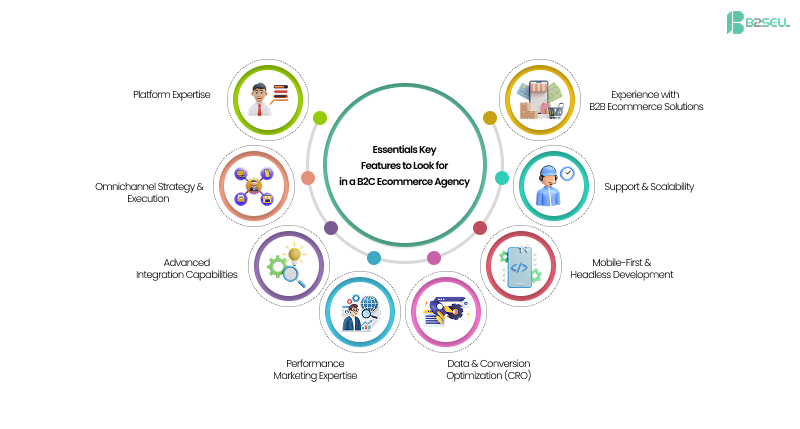
1. Platform Expertise
The agency should have certified, hands-on experience in popular ecommerce platforms such as:
- Shopify Plus – Designed for fast-growing D2C brands that need rapid market entry and seamless scalability.
- Magento / Adobe Commerce – For flexibility, customization, and complex B2C and hybrid business models.
- BigCommerce – For fast-growing brands with multichannel ambitions.
- Headless Commerce Platforms – For brands needing decoupled architecture and dynamic frontends.
📌 Tip: Ask for case studies showing successful implementations on your preferred platform.
2. Omnichannel Strategy & Execution
Modern consumers move between devices and platforms. Your agency should deliver:
- Seamless integration between web, mobile, social, and marketplaces.
- Unified brand and customer experience across all touchpoints.
- Real-time inventory and price consistency across platforms.
🔑 Why it matters: Omnichannel commerce is proven to increase customer lifetime value and retention.
3. Advanced Integration Capabilities
True success in ecommerce requires tight integration between your website and backend systems. Your agency must integrate:
- ERP systems (e.g., NetSuite, SAP, QuickBooks)
- PIM systems (like B2Sell PIM)
- CRM platforms (e.g., Salesforce, HubSpot)
- 3PL & Shipping providers
- Marketing automation tools
✅ Effortless integration means smoother workflows, fewer mistakes, and a better customer experience.
4. Performance Marketing Expertise
A great ecommerce site is only useful if people find it. Look for an agency that offers:
- SEO (Search Engine Optimization) with structured data and schema
- PPC (Pay-per-click) campaigns on Google & Bing
- Social commerce marketing across Instagram, Facebook, TikTok
- Retargeting and email/SMS automation
📈 Performance marketing drives measurable ROI and speeds up customer acquisition.
5. Data & Conversion Optimization (CRO)
Your agency should analyze how users interact with your site and continuously test improvements using:
- A/B and multivariate testing
- Funnel analysis and user behavior tracking (Hotjar, GA4)
- Performance reporting dashboards
- UX/UI improvements to boost conversions
6. Mobile-First & Headless Development
With mobile commerce dominating, your agency must deliver:
- Fully responsive or mobile-first design
- Headless commerce capabilities for faster, dynamic storefronts
- Progressive Web Apps (PWAs) for app-like performance
7. Support & Scalability
Post-launch support is critical. Ensure your agency offers:
- Ongoing maintenance and feature updates
- 24/7 support or SLA-based assistance
- Scalability to handle surges during sales and campaigns
- Localization and multi-storefront capabilities for global growth
8. Experience with B2B Ecommerce Solutions
With lines between B2B and B2C blurring, the agency should support hybrid commerce including:
- Volume pricing, bulk ordering, quote requests
- Role-based access and approval workflows
- Punchout catalog compatibility
- Integration with wholesale ecommerce platforms
💡 Hybrid models are the future of ecommerce — your agency must be prepared to deliver them.
B2B vs B2C Ecommerce: Why the Lines Are Blurring
In 2025, the rise of hybrid selling models means many brands operate in both B2C and B2B spaces. For example:
- A manufacturer sells to retailers (B2B) and direct to consumers (D2C).
- A wholesale ecommerce platform doubles as a D2C storefront.
This is why agencies must understand:
- B2B ecommerce platforms and order workflows
- Volume pricing, custom catalogs
- Buyer roles, approvals, credit limits
Must-Have Features for Hybrid Ecommerce:
- Account-based pricing
- PunchOut catalogs
- Multi-user permissions
- Integrated PIM and ERP systems
🚀 How B2Sell Enhances Ecommerce for Hybrid B2C & B2B Brands
B2Sell is the ecommerce integration and automation engine trusted by forward-thinking manufacturers, distributors, and retailers. It bridges the gap between traditional B2B selling and modern B2C experiences by enabling unified, scalable commerce.
Here’s how B2Sell transforms ecommerce for brands operating across B2C and B2B channels:
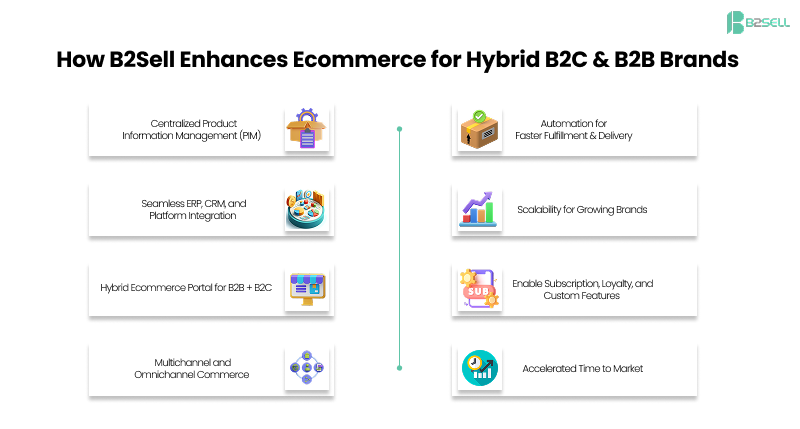
1. Centralized Product Information Management (PIM)
Manage product data across thousands of SKUs and multiple storefronts:
- Centralized dashboard to manage product content, attributes, images, specs
- Consistent data across B2B portals, D2C websites, and marketplaces
- Auto-synchronization with Magento, Shopify, BigCommerce, and others
⚙️ Boosts product accuracy and speeds up time to market.
2. Seamless ERP, CRM, and Platform Integration
B2Sell connects with all major systems to ensure real-time data sync:
- Inventory levels update across channels automatically
- Customer info and pricing rules sync from your ERP/CRM
- Orders flow directly into your fulfillment system without delays
Supported integrations include:
- SAP, NetSuite, QuickBooks
- Salesforce, HubSpot
- Magento, Shopify, BigCommerce
- Marketplaces like Amazon, eBay
🔄 No more silos or duplicate data — just smooth operations.
3. Hybrid Ecommerce Portal for B2B + B2C
Support both buyer types with a single backend:
- Role-based access for B2B customers
- Retail pricing and guest checkout for B2C shoppers
- Dynamic catalogs based on customer groups
- Volume discounts and order approvals for B2B users
🛒 Custom experiences for every customer type — without managing separate systems.
4. Multichannel and Omnichannel Commerce
Push product data, pricing, and inventory across:
- Webstores
- Mobile apps
- Amazon, eBay, Walmart
- Social commerce platforms (Meta Shops, TikTok Shop)
📦 One source of truth, everywhere your customer shops.
5. Automation for Faster Fulfillment & Delivery
- B2Sell automates complex ecommerce workflows:
- Order routing to nearest warehouse
- Invoice and payment sync with accounting tools
- Real-time shipping rate calculations and tracking updates
- 🚚 Reduce delays, errors, and manual touchpoints across your ecommerce operations.
6. Scalability for Growing Brands
Whether you're selling to 500 or 50,000 customers, B2Sell can scale:
- Handle peak season traffic with no downtime
- Add new stores, languages, or currencies as you grow
- Monitor performance with detailed dashboards and alerts
📊 Scale with confidence as your brand expands into new regions and channels.
7. Enable Subscription, Loyalty, and Custom Features
B2Sell supports deep customization including:\n- Subscription models and recurring orders\n- Loyalty and rewards programs\n- Custom pricing and promotion engines\n- Marketplace or reseller portals
💡 Adapt your business model without changing your tech stack.
8. Accelerated Time to Market
With pre-built connectors and API-ready architecture, B2Sell enables:\n- Fast implementation without custom development from scratch\n- Quicker onboarding of new channels or business units\n- Reduced dependency on IT teams
⏱️ Launch new ideas faster and stay ahead of your competitors.
Real-World B2B Ecommerce Examples Meeting D2C Demands
Example 1: Industrial Tools Supplier
- Expanded from B2B to D2C using a Magento platform
- Integrated PIM and ERP via B2Sell
- Used customer segmentation to show B2C pricing
Example 2: Fashion Wholesaler
- Launched retail-facing Shopify store
- Linked inventory to wholesale backend
- Implemented loyalty for D2C while maintaining bulk B2B logic
These hybrid models prove that future-ready agencies need expertise beyond just "B2C."
Common Mistakes to Avoid
- Choosing based on price alone
- Ignoring integration capabilities
- Underestimating ongoing optimization
- Failing to align tech stack with business model
- Not asking for post-launch support plans
Future Trends in B2C Ecommerce Agency Services
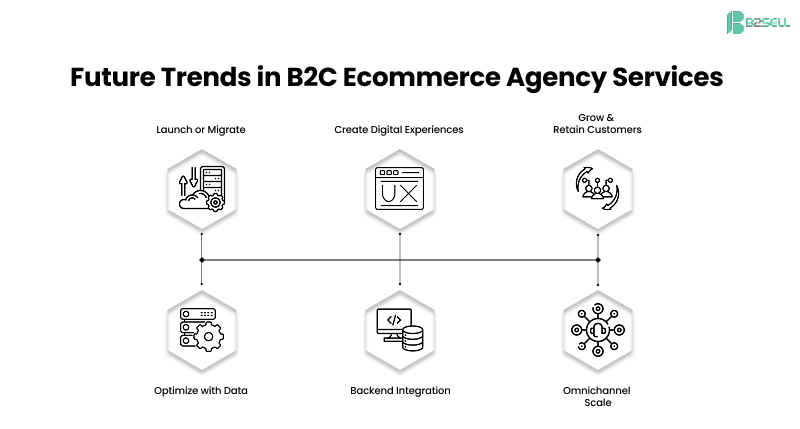
- Composable Commerce: API-driven, plug-and-play ecosystems
- AI & Personalization: Smarter recommendations and dynamic content
- Voice & Chat Commerce: Rise in natural-language shopping
- Subscription & Membership Models: Retention-focused strategies
- Sustainability & Green Commerce: Eco-friendly fulfillment partnerships
FAQs: Choosing the Right B2C Ecommerce Partner
What is the best ecommerce platform for B2C in 2025?
Shopify Plus and Magento (Adobe Commerce) lead the way for flexibility, scale, and integrations.
How much does a B2C ecommerce agency charge?
Pricing varies from $20,000 to $250,000+ depending on scope, platform, and integrations.
Can one agency handle both B2B and B2C ecommerce?
Yes, agencies with B2B ecommerce solutions experience can handle hybrid models effectively, especially with platforms like B2Sell.
What is a multichannel ecommerce platform?
It allows selling across multiple channels (online store, marketplaces, social, etc.) from one backend system.
What’s the difference between multichannel and omnichannel commerce?
- Multichannel = Selling in multiple places
- Omnichannel = Creating a unified experience across them all
Final Thoughts: Choose a Future-Proof Ecommerce Partner
In 2025, your B2C ecommerce agency is more than a vendor—they are your digital growth partner. Choosing the right agency is a high-stakes decision, but armed with the right knowledge, you can make a confident choice.
Evaluate potential partners based on their:
- Technical capabilities
- Industry experience
- Marketing sophistication
- Integration expertise
- Commitment to innovation
B2Sell empowers agencies and brands with powerful ecommerce integrations, enabling seamless omnichannel commerce and bridging the B2B-B2C divide.
If you're looking to build a resilient, scalable ecommerce strategy for 2025 and beyond, choose a partner like B2Sell that evolves with your business.
Ready to Elevate Your Ecommerce in 2025?
Pair your B2C ecommerce agency with the power of B2Sell Integrations and future-proof your online business.
👉 Explore B2Sell Integrations and discover how we simplify ecommerce operations for high-growth brands.


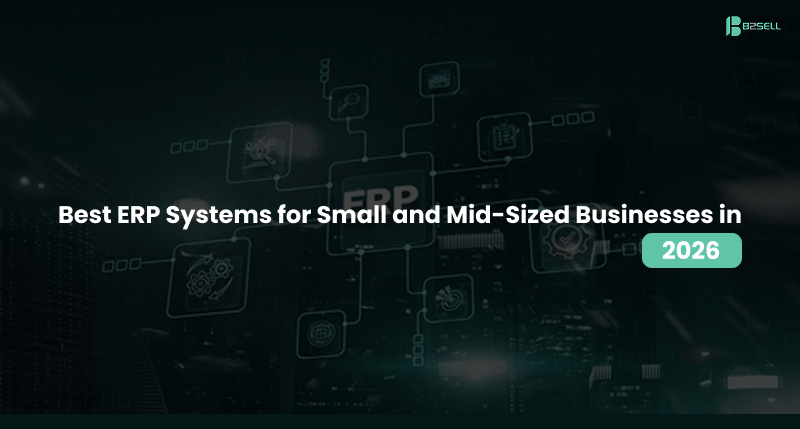

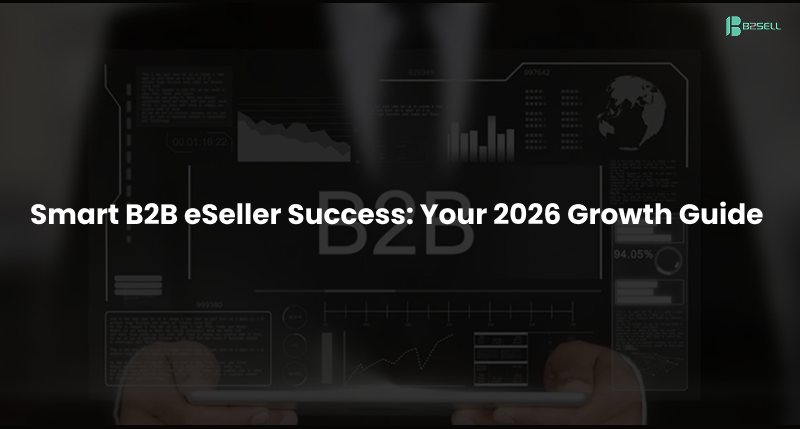


.png)